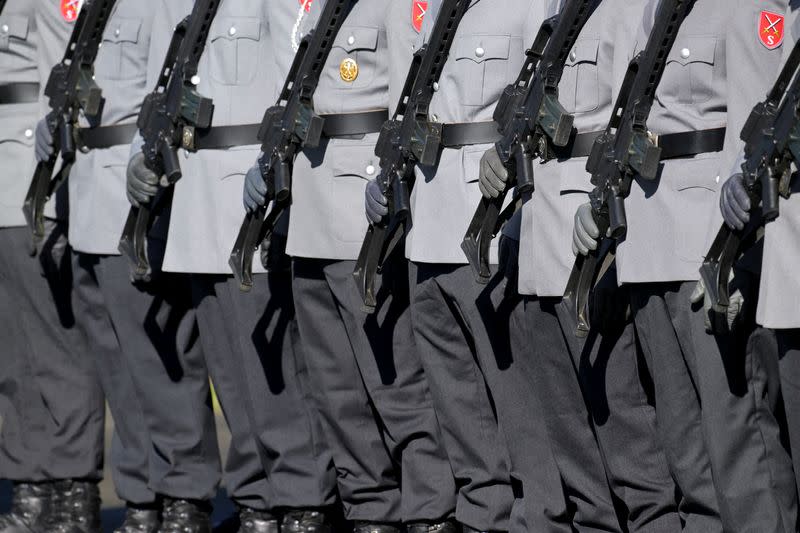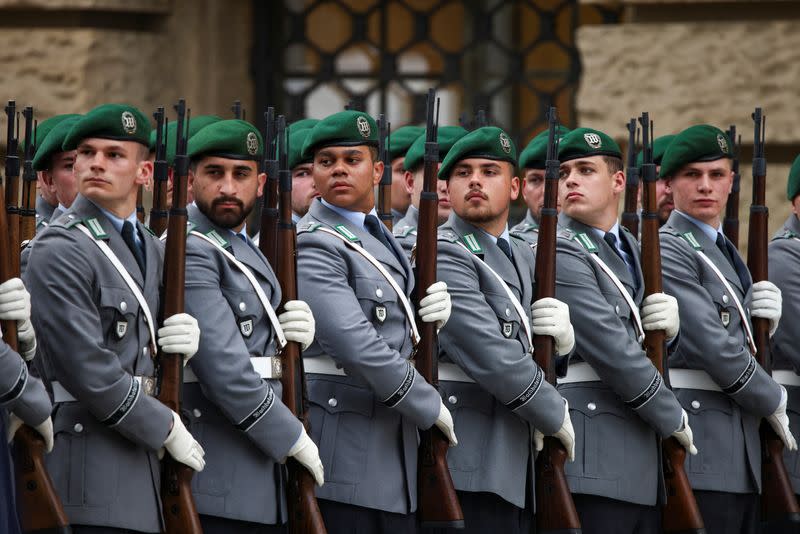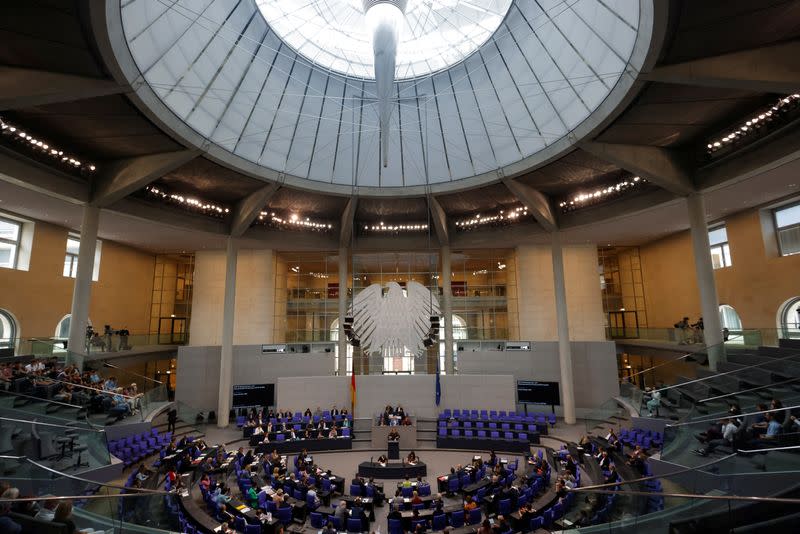Analysis-Infighting over budget imperils Germany’s defence upgrade
By Sabine Siebold and Maria Martinez
BERLIN (Reuters) - Budget infighting within Germany's governing coalition is jeopardising its plan to meet defence commitments to Western allies even as tensions with Russia rise and a NATO-sceptic Donald Trump bids for a second term as U.S. president.
Since the 1990s Germany has thrown off its post-World War Two aversion to military action. But it has faced criticism – not least from Trump in his first term – for repeatedly missing a NATO target of spending 2% of its economic output on defence. Days after Russia's 2022 invasion of Ukraine, Chancellor Olaf Scholz surprised allies by announcing a "Zeitenwende" – German for a historic turning point - with a 100-billion-euro ($107 billion) special fund to bring the military back up to speed.
But while top-ups from that fund will allow Berlin to meet the 2% target over the next three years for the first time since the end of the Cold War in 1990, there is uncertainty about how to achieve the spending goal when the fund is exhausted in 2028.
Moreover, Germany's military top brass warns the Bundeswehr needs additional funds right now to be combat-ready in five years, when they believe Russia will be capable of attacking NATO member-state territory.
With Europe's largest economy at just over 4 trillion euros in gross domestic product, the current defence budget of 52 billion euros is some 28 billion below the NATO target.
"We have to remember that during the Cold War, under chancellors Adenauer, Brandt and many others, Germany spent more than 3% of GDP on defence," NATO Secretary General Jens Stoltenberg told German public broadcaster NDR last week.
He said higher defence spending by Europe's biggest economy now makes a big difference for the alliance.
"So we have done it before, not because we enjoy investing in defence, but because it is necessary to secure peace."
Germany's fractious coalition of left-leaning Social Democrats (SPD), pro-business liberals and ecologist Greens are struggling to find the money to comply with the NATO target, given self-imposed rules that limit the amount of state borrowing they can take on.
"There's a broader strategic question about the long-term trajectory of defence spending in Germany and how compatible or not that is with the country's institutional fiscal rules," said Mujtaba Rahman, Eurasia Group managing director for Europe.
PASSING THE BUCK
For now, Scholz has sided with liberal Finance Minister Christian Lindner in rejecting calls by Defence Minister and SPD ally Boris Pistorius to increase annual defence spending next year by 6.7 billion euros to initiate more investment - in effect, postponing a solution till after the 2025 election.
"The next government will be elected in 2025 and will have to provide an answer to then continue the Zeitenwende," said Marcel Schlepper, military expert at the Ifo institute.
Aside from the political uncertainty that creates, each year the annual spending upgrade is delayed, the sharper the uplift will ultimately have to be to meet the 2% target: Projections show that shortfall will have reached 40 billion euros by 2028.
Andreas Schwarz, an SPD member of parliament's budget committee, said that without extra funding Pistorius would be left next year with a relatively meagre 500 million euros for investments in defence procurement.
"He needs the 6.7 billion euros to keep investing, to encourage the defence industry to ramp up capacities and deliver to the troops what they urgently need," he noted, adding that some of the military's most pressing purchases such as ammunition, air defences and rocket artillery might be affected. The country's arms makers, faced with constant calls to expand production capacities, are not pleased either.
CRUNCH TIME
Defence industry officials argue that Germany has saved hundreds of billions of euros since the Cold War by not meeting the NATO target, creating a need for greater investment now.
The defence industry association, headed by Rheinmetall CEO Armin Papperger, reminded Scholz of his 2022 pledge to from now on reach the NATO goal. "The current mid-term planning sees the defence budget frozen at 52 billion euros for the coming years, a sum that in two years time already will only cover the Bundeswehr's fixed costs and leave no space for additional purchases," the association said in a statement last week.
It estimated a further 100 billion euros would be needed by 2028 to plug gaps in the military's inventory, which include air defence systems, long-range missiles and ammunition.
For now, such a prospect appears dim. A defence source told Reuters the chancellery had warned the defence ministry that it cannot expect to receive any fresh financial authorisations until 2028, a year reflected for the first time in the mid-term financial planning being worked on now together with the 2025 budget.
Instead, the chancellery suggested defence officials talk to arms makers and convince them to start producing weapons for the Bundeswehr at their own cost and without a contract, accepting that payment wouldn't come until 2028, said the source - adding the idea was greeted with disbelief at the defence ministry.
A spokesperson for the defence ministry said she could neither confirm nor deny this information. A spokesperson from the chancellery said it was false.
One military source said army leaders regarded the outcome of the budget row as a litmus test of politicians' commitment to a genuinely transformational "Zeitenwende".
"We are at a crunch point," said the source. "Either we get onto the autobahn and drive full speed, or we come to a standstill."
($1 = 0.9301 euros)
(Reporting by Sabine Siebold and Maria Martinez; additional reporting by Andreas Rinke and Andrey Sichev; editing by Mark John and Mark Heinrich)




